“Seriously what’s the appropriate reason for a married person to go out for a meal alone with a member of the other sex (outside of family)?”
Back in March, conservative Christian Matt Walsh asked this question on Twitter.
Friendship? Discussing doing business together? On the same business trip? Enjoying each other's company? A common interest?
— Dave Hogg ✨ (@stareagle) March 30, 2017
This conversation started when Ashley Parker of The Washington Post wrote a profile piece on Karen Pence, wife to Vice-President Mike Pence.
In 2002, Mike Pence told the Hill that he never eats alone with a woman other than his wife and that he won’t attend events featuring alcohol without her by his side, either.
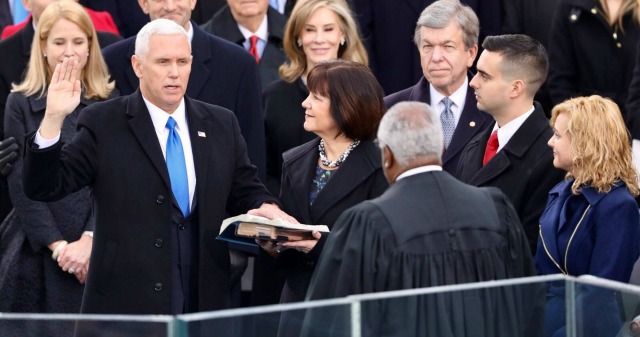
This also came up in 2016, during the campaign season. This quote comes from an article in The Indianapolis Star.
During his 12 years in Congress, Pence had rules to avoid any infidelity temptations, or even rumors of impropriety. Those included requiring that any aide who had to work late to assist him be male, never dining alone with a woman other than his wife, and not attending an event where alcohol is served unless Karen was there.
In a 2002 interview with The Hill, Pence called it, “building a zone around your marriage.”
“If there’s alcohol being served and people are being loose, I want to have the best-looking brunette in the room standing next to me,” Pence said.
Now it’s September, and no one is still talking about this, so it seems like a good time to point out the problem with some of these boundaries.

I’ve blogged about boundaries before, from the perspective of a bisexual woman. If I follow the logic behind setting boundaries around my marriage, I literally can’t have any friends because I could cheat on my husband with any non-family member. Ridiculous, right?
Since writing that piece, I knew I wanted to explore boundaries again. Inspiration struck when Mike Pence’s boundaries became public.
I decided to examine the question asked by Matt Walsh.
Is there an appropriate reason for a married person to go out for a meal alone with a member of the other sex (outside of family)?
Based on my own experience, I think a married person has multiple appropriate reasons to share a meal with a member of the opposite sex. (As a bisexual woman, I also dine alone with other women. Scandalous!)
At the very least, career opportunities come to mind. I interviewed for a job with a male employer over lunch. Dan takes business trips with a female colleague and/or his female boss.
But I also wanted to hear what other people thought. So I put together a totally not-scientific survey to find out. These are the results.
Belle Brita Career Survey
I called my survey Belle Brita Career Survey. I introduced the survey as a career survey, not a question about boundaries or gender equality. Respondents should have read the following before taking the survey, since I posted this text at the beginning of the survey.
The following questions ask about informal situations that directly or indirectly help careers. For this survey, an informal situation refers to any in-person contact outside of the workplace. Some questions ask if another person helped your career. Other questions ask if you helped someone else’s career.
But careful respondents might have realized the actual purpose behind my survey. I wanted to know if informal settings, like a meal, positively impacted careers.
Before I jump into the results, I need to acknowledge the shortcomings of my survey.
The biggest problem is that I screwed up an answer choice on two questions. The first one I fixed quickly, after my best friend Bethany pointed it out. That error was in the age ranges for a demographics question. The other error is an answer choice not properly matching the question, which I only just noticed while reading through the survey results. I will point this out when I share that question’s results.
I don’t think these impacted the results much, but either could have confused respondents.
Otherwise, this survey’s limitations include:
- mostly white women responded
- mostly friends and family responded
- I have zero training in writing surveys
- only 103 people responded
That said, I still think the survey results prove that yes, career advancement is an appropriate reason for a married person to share a meal with a member of the opposite sex.
Survey Demographics
80.6% of respondents (83 total) identify as female. 18.4% of respondents (19 total) identify as male. 1 person preferred not to say.
67% of respondents (69 total) are aged 23-32. 12.6% of respondents (13 total) are aged 33-42. The other age groups have 7 or less respondents each.
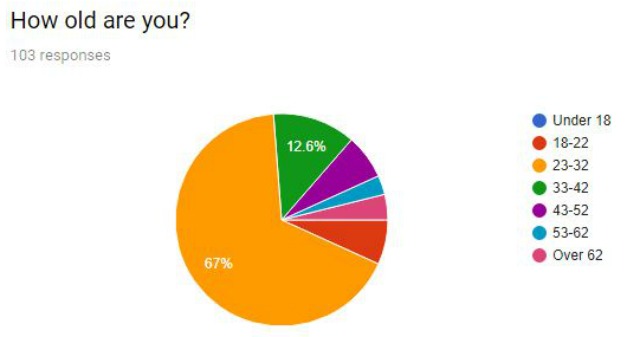
82.5% of respondents (85 total) are white. 6.8% of respondents (7 total) are Hispanic or Latino. Each other demographic for race/ethnicity has 3 or less respondents. I did receive 2 interesting write-in answers: homeschooler and American.
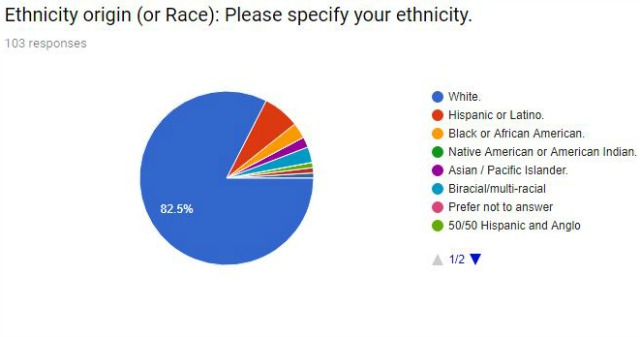
Have you ever met with someone one-on-one, in an informal setting, who helped your career?
76.7% of respondents answered Yes to this question.
This question preceded a set of questions asked about receiving career help through informal settings.
When asked about the type of informal setting, these were the most popular responses.
- a meal or snack – 50.5%
- alcoholic drinks – 10.7%
- a sports game, arts performance, etc. (as audience members, like going to a baseball game) – 5.8%
This question was mandatory, so 22.3% of respondents confirmed: “No one has helped my career after meeting one-on-one in an informal setting.”
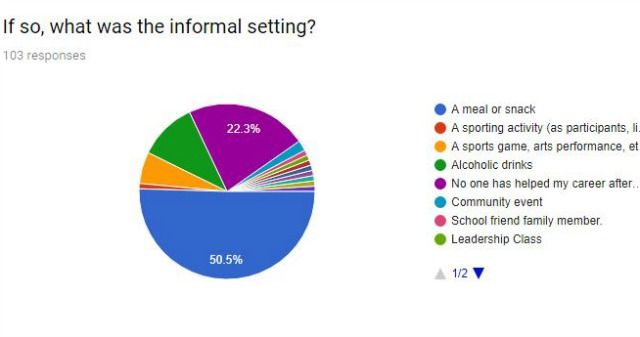
When asked about the career help, these were the most popular responses. Respondents could select more than one answer.
- answered my questions about a career or workplace – 50.5%
- introduced me to other people who could advance my career – 40.8%
- told me about a job opening – 31.1%
- wrote me a recommendation or served as a reference – 27.2%
- served as my career mentor – 26.2%
Optional: Provide details about who helped your career and how
Finally, respondents could choose to provide additional details about who had helped their career. Here are a few of the best responses.
- My old boss’ best friend recommended me for a pharmacy tech job in a different store in the same chain he was a pharmacist for.
- Multiple professors meeting for coffee or local dive bars discussing pedagogy, career paths/alternatives, volunteering to read work in progress, review CVs
- This is how I have gotten nearly all of my jobs, so it has played out in several ways!
- I was new to Seattle, switching careers from journalism to political consulting, and couldn’t get any of the consulting firms to email or call me back. I reached out to a friend who was connected to several political consultants on LinkedIn through her job, and she put me in touch with a man she thought would be particularly helpful. He absolutely was, sending email intros to three different consultants, two of which landed me job interviews. I didn’t get those jobs, but I had the in I needed in the political world to get me where I am today–and that is working as a Senior Strategist at a digital political consulting firm.
- She was my past boss, friend, and mentor. After I left the mutual business we worked at, we met for lunch, and she helped me lay out a plan for my (then) immediate future.
- A fraternity alumnus told me about the graduate program in which I am currently enrolled and provided advice on steps to take to improve my application.
- Former EVP of marketing who had moved onto a new job. Phone calls and ongoing meetings when he was in town to touch base and mentor until one day he offered me a job and moved me to Oregon to work for him.
Have you ever helped someone with their career either during or after meeting with them one-on-one in an informal setting?
68% of respondents answered Yes to this question.
This question preceded a set of questions asked about giving career help through informal settings.
When asked about the type of informal setting, these were the most popular responses.
- a meal or snack – 49.5%
- alcoholic drinks – 5.8%
Again, this question was mandatory, so 25.2% of respondents confirmed: “No one has helped my career after meeting one-on-one in an informal setting.”
Except that should not have been an answer choice. It should have read: “I have not helped anyone’s career after meeting one-on-one in an informal setting.” This incorrect answer choice might have impacted survey results.
5 people wrote in answers about communication online or by phone, which doesn’t match the definition I provided for an “informal setting.”
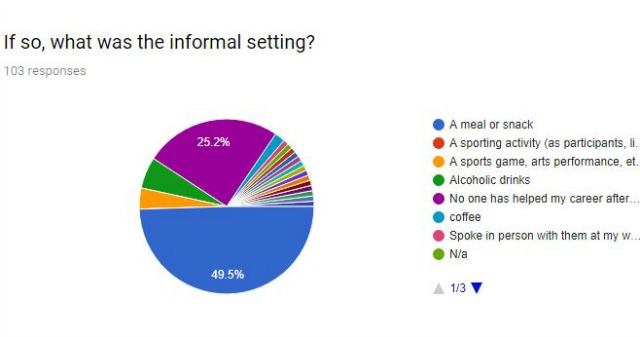
When asked about the career help, these were the most popular responses. Respondents could select more than one answer.
- answered their questions about my career or my workplace – 55.3%
- told them about a job opening – 41.7%
- introduced them to other people who could advance their career – 27.2%
Optional: Provide details about how you helped someone’s career
Finally, respondents could choose to provide additional details about they had helped someone’s career. Here are a few of the best responses.
- I let them know of opportunities and encouraged them to keep trying. Just being someone who says they can accomplish something and being positive.
- A young woman was introduced to me over email by a mutual friend. She was looking to start a career in policy, the environment, or economics. I brought her along with me to a Sierra Club happy hour to get to know her better, and realized she was a great fit for a budget and policy paid fellowship that was opening up. I recommended her and introduced her to the B and P team, and she landed the fellowship.
- When I left my job i spoke with a friend about the job opening and how she’d be a perfect fit. She got the job!
- Former teammates who reported to me have approached me via phone or in person for references and to bounce career options and thoughts off of me.
Boundaries to Protect Your Marriage Also Protect the Old Boys’ Club
Each marriage is unique, and I normally don’t judge what consenting adults decide to do about their own lives. Dan and I follow our own mix of traditional and non-traditional gender roles. What works for us won’t necessarily work for all other couples. That’s okay! As long as you aren’t hurting anyone else, then you should make the best decisions for your own marriage, regardless of what other people do.
But certain boundaries actually do hurt other people, disproportionately women. The boundaries of Mike Pence and other men hold back women professionally by maintaining the old boys’ club.
The Old Boys’ Club
The old boys’ club, or the old boys’ network, generally refers to a group of men who use social connections to advance professionally. They might associate together formally through an organization like a Greek-letter fraternity or a social club. They might associate together informally, like as old family friends or school alumni.
Wikipedia describes it as:
An old boy network, or society (also old boys’ club), can refer to social and business connections among former pupils of male-only private schools. The term originated from much of the British elite having attended certain public schools as boys, thus former pupils are “old boys.”
…It can also mean a network of social and business connections among the alumni of various prestigious schools. In popular language, old boy network or old boy society has come to be used in reference to the preservation of social elites in general… The phrase “It’s not what you know, it’s whom you know” is associated with this tradition.
Urban Dictionary describes it as:
An informal system by which money and power are retained by wealthy white men through incestuous business relationships. It is not necessarily purposeful or malicious, but the “Old Boys’ Network” can prevent women and minorities from being truly successful in the business world. It entails establishing business relationships on high-priced golf courses, at exclusive country clubs, in the executive sky-boxes at sporting events, through private fraternities or social clubs (such as the Free Masons), et cetera. These are arenas from which women and minorities are traditionally excluded and thus are not privy to the truly “serious” business transactions or conversations. A business person who does not travel in these elite circles of influence will miss out on many opportunities.
Gender Gap in Senior Management
However, an old boys’ club can also form in a work environment when CEOs, vice-presidents, and politicians choose who to mentor, who to invite to golf, who to promote.
According to the Fortune Knowledge Group, only 4.2% of the CEOs of Fortune 500 companies are women. The same study looked at over 7,500 senior management positions–and found that women hold only 19% of those positions.
The gender gap exists in politics too. In the current US Congress, women make up just 19.6% of members. Only 6 women serve as state governors.
With men holding so many top positions in the workforce, they have the power to advance careers. What happens when these men limit how female employees can interact with them?
Women Need Access to Male Networks
I wrote a gender-neutral survey. I wanted respondents to share their career experiences regardless of gender.
While the survey is not scientific, the results are clear. You can advance your career by connecting with other people one-on-one in informal settings. Thus, when men refuse to meet with women one-on-one, they limit women’s career opportunities.
I’m not the only one who has drawn this conclusion. The following are a few select quotes from other writers.
How sexual harassment training hurts women – LA Times
In the LA Times, Kim Elsesser writes:
Wherever a sex partition exists, it limits women’s ability to connect with their colleagues and therefore limits their careers. The research is irrefutable: Those with larger networks earn more money and get promoted faster. Because men typically dominate senior management, there’s evidence that the most valuable network members may be men. Without access to beneficial friendships and mentor relationships with executive men, women won’t be able to close the gender gap that exists in most professions.
Why Some Male Members of Congress Won’t Be Alone With Female Staffers – National Journal
National Journal conducted an anonymous survey of female staffers in Congress. This survey discovered:
[S]everal female aides reported that they have been barred from staffing their male bosses at evening events, driving alone with their congressman or senator, or even sitting down one-on-one in his office for fear that others would get the wrong impression…
Male staffers said they’d also seen some female aides barred from solo meetings with the boss, and that they benefited in some instances from the exclusion of their female colleagues in high-level meetings, at receptions with major Washington powerbrokers, and just in earning a little more face time with their bosses.
For these women, the lack of access has meant an additional hurdle in their attempts to do their jobs, much less further their own careers. And in many instances, it forced them to seek employment in other congressional offices.
How Pence’s Dudely Dinners Hurt Women – The Atlantic
In The Atlantic, Olga Khazan writes:
Social-science research shows this practice extends beyond politics and into the business world, and it can hold women back from key advancement opportunities. A 2010 Harvard Business Review research report led by Sylvia Ann Hewlett, the president of the Center for Work-Life Policy think tank, found that many men avoid being sponsors—workplace advocates—for women “because sponsorship can be misconstrued as sexual interest.”
Hewlett’s surveys, interviews, and focus groups found that 64 percent of executive men are reluctant to have one-on-one meetings with junior women, and half of junior women avoid those meetings in turn. Perhaps as a result, 31 percent of women in her sample felt senior men weren’t willing to “spend their chips” on younger women in office political battles. What’s more, “30 percent of them noted that the sexual tension intrinsic to any one-on-one relationship with men made male sponsorship too difficult to be productive.”
How to Set Boundaries at Work (Without Discriminating Against Women)
I hear the self-righteous indignation on the other side of the screen. You just want to protect your marriage! You can’t risk even false, mean-spirited gossip of impropriety!
Okay.
Set boundaries at work to protect your marriage.
But make those boundaries gender-neutral.
Don’t dine alone with any business associate, colleague, or employee.
When working late, insist on multiple people staying at the office to finish up a project.
Keep your office door open for any one-on-one meetings. Or invite a third person to join the conversation if it needs to take place behind closed doors.
Mentor younger employees in pairs or in groups.
When driving for work-related events, share a car with multiple people, or drive completely alone.
To some of my readers, all of this might sound ridiculous. Certainly I don’t expect my own husband to follow these boundaries. (Psst, that’s because I trust him!)
But gender-neutral boundaries are better than discriminatory boundaries. If you need to avoid certain actions with women to protect your marriage, then avoid the same actions with men.
Assuming these sorts of actions have zero effect on your career (or the careers of your peers), then you won’t lose anything by setting gender-neutral boundaries. However, if following gender-neutral boundaries would negatively affect your career (or the careers of your peers), then why should only women suffer the negative repercussions?
Gender-Neutral Boundaries on the Hill
This concept has worked for at least two Republican representatives. (While this is a direct quote, I believe the writer made an error in describing the “seven-to-seven” policy).
Jason Chaffetz of Utah and Tim Huelskamp of Kansas said they’ve adjusted their office policies to avoid, as Chaffetz put it, “the appearance of any impropriety in any way shape or form.”
Chaffetz has instituted a “seven-to-seven” policy, not allowing any staffers of either gender to arrive in his office before 7 a.m. or leave after 7 p.m. without express permission. “You do the best you can to make sure those people are leaving at reasonable hour, make sure there [are] plenty of people around and that sort of thing,” Chaffetz said.
Similarly, Huelskamp said he makes sure to keep numerous staffers around him and send the whole team home at a reasonable hour. “There are a lot of reckless charges around here and people politicizing things as well. So we try to keep more than one person around on staff. And that’s to avoid any appearance [of an issue] and folks running around spreading rumors,” Huelskamp said.
Additional Reading
Mike Pence doesn’t dine alone with other women. And we’re all shocked.
This 2002 Mike Pence Comment Has Twitter Up In Arms
Vice President Pence’s “never dine alone with a woman” rule isn’t honorable. It’s probably illegal.
Mike Pence’s Marriage and the Beliefs That Keep Women from Power
Phew, that was fun. I started thinking about this post a few years ago. I’ve read too many blog posts by other lifestyle bloggers about the “boundaries” and “guardrails” needed to protect their marriages. While I partly addressed the problems with boundaries in my satire, I still wanted to address the career implications. I put off writing this post due to the immense research needed…
Luckily, the revelation of Mike Pence’s boundaries spurred on the Internet to do my research for me!
Tell me about your career! Does your job require one-on-one time with clients, colleagues, etc.? Has a conversation over a meal ever benefited your career? Inquiring minds need to know!


I’ve definitely seen my share of articles about Christian marriage “boundaries.” I think it is part of a culture that does disservice to both men and women. It’s similar to the problem with purity culture, when we establish that men are not to be trusted and are completely controlled by their sexual urges.
Yup, exactly. Purity Culture teaches that men “only want one thing,” and that men & women can’t be just friends. Or colleagues, apparently.
I agree with Sara – the fact that boundaries are being brought up indicates to me that without these boundaries, someone wouldn’t be able to sexually control themselves around someone of the opposite (or even same) sex. Much like rape culture and teaching men to not rape instead of women how to avoid being raped, we should deal with the root of the issue (controlling sexual urges and being professional) instead of instating boundaries. I’m very glad you expanded on the issue of how these boundaries can contribute to discrimination in the workplace, something I highly doubt that Pence has ever considered. I was surprised to hear that some congressmen have taken gender-neutral steps to handling this.
I feel like you shouldn’t need to follow strict rules to not cheat on your spouse. I know some people justify the boundaries not because they don’t trust themselves (or their spouse), but to avoid gossip and rumors. Which might be important if you’re important… But
1) I see this from people who aren’t exactly famous and 2) plenty of men continue to have successful careers after multiple *rape* accusations. So I don’t think a little unfounded gossip about a man cheating will actually ruin his career.
Also, the research mentioned that plenty of people in Congress weren’t even aware of their colleagues practicing these boundaries. Since most people only spoke on the condition of anonymity, it’s hard to discern how many Congresspeople are/were discriminating against female staff.
I’ve always worked in predominantly female dominated jobs and I’ve never felt the need to establish any boundaries in terms of being alone, dinner, etc.
But I approve of the idea of gender-neutral boundaries if that helps increase comfort (and protection against a variety of abuse and impropriety).
In a larger context- do these pro-boundaries lifestyle bloggers not have friends different genders? Are you expected to give up your friend groups once you get married? I find it all a bit baffling really. If you can’t trust your spouse without such hard and fast boundaries, do you really trust them?
Honestly, I don’t think those lifestyle bloggers have friends of different genders. I read most of these posts in my first year of Belle Brita, when I was trying to read and comment on posts from a large number of bloggers. In my satire post, I only linked to larger websites/bloggers because I didn’t want to attack the lifestyle bloggers I had read. But yeah, they said never to ride in a car alone or go out to eat with someone of the opposite sex or be alone at all with someone of the opposite sex.
I have so many close guy friends. I don’t get to see them often, so I jump at any opportunity to spend time with them–even if Dan can’t join us.
My job does involve one-on-one teaching sessions and you can bet I don’t give lessons to any private students without keeping the door open and keeping the sense of safety and transparency (for both of us) that that provides. We try to always have multiple adults around or within easy reach, even though usually in a different room, during lessons. When we renovated the office where we’re now teaching, I put huge windows in the walls between individual classrooms to make sure–child safety and teacher safety are both very important to me.
Before we got married, Angel asked me how I felt about him having pretty much 100% female coworkers (a natural result of being a nurse), because his ex had problems with that. My response was, “I’m pretty sure you’re smart enough to know the difference between a coworker and a wife.” Not everybody does know the difference, however.
When it comes to just friends, I do think I wouldn’t appreciate it if Angel wanted to spend extended alone time without me and with a lady friend that I didn’t know, and take her out for dinners instead of me. I’d be like, hey, stop leaving me at home, that’s lame, and take me out for lunch! I typically don’t spend time with all my guy friends, many of whom I’ve been close to since high school, without Angel or my family, who are also friends with them, but that just seems natural, because we’ve been together so long at this point he’s friends with all my friends and we all hang out together, even though I was the one who first connected him to my Malaysian friends. I met him at 17 and have known him and shared friendships and homes my entire adult life so yeah, I’d be a little weirded out if he wanted to suddenly meet people and not have me be a part of that.
I totally support protecting kids (and teachers)–that still sounds like a gender-neutral policy 😉 When I was at Furman and met with professors, the door always stayed open. Conversations were still private due to the layout of their offices, but anyone walking by could see (or eavesdrop, if you wanted to stand in the doorway).
I remember that quote from my last post on boundaries. I was thinking about it when I wrote this! It feels so obvious. Shouldn’t we trust our spouses not to cheat on us? Cheating isn’t just one accidental action. It’s a series of choices that leads to the cheating.
I wouldn’t appreciate if Dan wanted to buy a new friend (male or female!) dinner in Cumming while I had to stay at home. But we both travel fairly often without the other. If I’m visiting my dad, and one of my friends from high school is in town, absolutely we’re going to grab dinner or drinks! Dan sometimes has opportunities during his work travels to meet up with friends of ours, and I have no problem with him joining a female friend for a meal.
Especially in this day and age, with constant news stories about women getting left behind in the workplace, I love these ideas you’ve put forward about gender-neutral policies. Exclusion is a real risk and must be prevented! Also, I firmly believe a healthy marriage should allow for socialization of all types (work and not work-related)!
I’m so glad you like my ideas! These sorts of exclusionary practices are insidious and hard to prove as gender discrimination. If someone must have them, gender-neutral policies protect everyone fairly.
And yeah, I always assumed a healthy marriage involved trust! Silly me! Apparently I’m supposed to assume my husband will hit on any woman he ever meets…
I used to work in mental health so I regularly met one-on-one with male clients and no one thought twice about it. The only time gender was considered when assigning a counselor was when someone had a traumatic background.
I’ve since left and moved to the corporate world and things are much different. I have a male colleague who we both started working for this company at the same time. Being the only two new people on the team meant we went through all of our trainings together and now bounce things off of each other before going to more senior employees. This has been our relationship for over a year. Just the other day, a woman who is more senior than us in the company made a comment about how much time my colleague and I spend together and how rumors can start. I literally responded with “everything I do is fine with my husband, so it should be of no concern to you”.
But I was (and still am) shocked that someone would say something like that. The two of us have exceeded all expectations in our roles and are now among the top ranked employees. There is no doubt in my mind that I would not have been able to do that without his support and vice versa. I really wanted to snap back to that woman and say “yes, rumors are started by people like you”. I find it so bizarre that people think relationships can’t be had with the opposite gender if it’s not sexual.
I’m shocked that anyone would say that too. Clearly you and your colleague have a strong work relationship that benefits your careers (and your employer). What’s so wrong about that?!